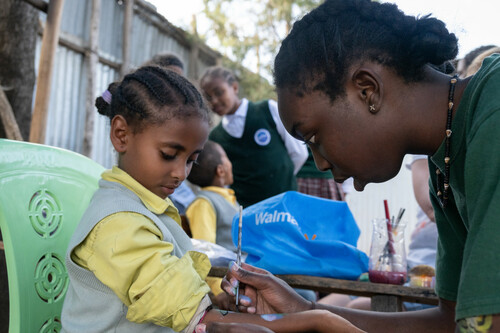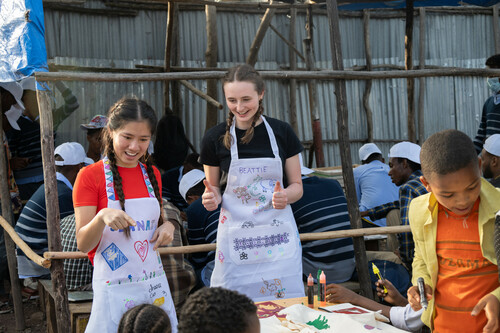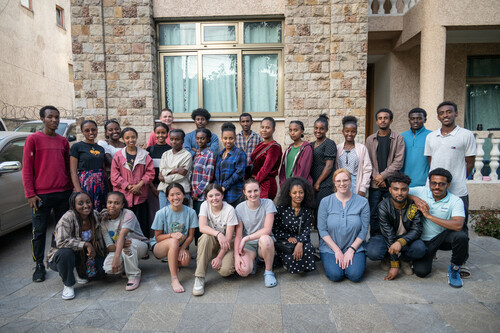Albertans Paying It Forward: Real Humanitarian

Image: Real Humanitarian's February 2024 Expedition - volunteer doing face-painting with students
This story is one of ACGC's five-part series on Albertans 'paying it forward' in their work to make the world a more just, fair, and sustainable place for all. This story centers around the work of Real Humanitarian, which is dedicated to assisting disadvantaged children, their families, and communities break free from the cycle of poverty.
NOTE: quotes and details are taken from an interview with Rachel Austin in July 2024, unless otherwise noted.
----
For Rachel Austin, international development is a lifelong passion fueled by her family. Rachel is the Executive Director of Real Humanitarian (formerly known as Canadian Humanitarian), a non-religious, non-political, registered Canadian Charity dedicated to assisting disadvantaged children, their families and communities break free from the cycle of poverty. Her parents, Dr. Richard and Deborah Northcott, founded the organization 21 years ago.
“They began out of their love of Ethiopia. They adopted two children [from Ethiopia] in the mid-90s and my father began travelling there more often, looking at ways they could help,” says Rachel of her parents. This eventually led to the creation of Real Humanitarian, supporting their first cohort of 40 students in 2004. Today, there are nine educational and support centers designed to provide comprehensive support to each child participant to fill the critical gaps impeding their development and success, giving children the chance to break through the cycle of poverty. From 40 students in 2004 to having over 500 students now, it has been a real journey for the organization.
“That first group of 40 students is all grown up now,” which Rachel refers to as a major success. “They’re now adults, they have careers, they’re able to look after themselves and their families, and these stories are the true highlights and the true exciting part of this work.” Students can begin Real Humanitarian’s education program as early as the age of four or five and continue through to the end of high school, and after that, they are part of the scholarship program, where Real Humanitarian provides financial support for them to attend post-secondary school or vocational training. Education isn’t the only focus for Real Humanitarian, but it is at the heart of what the organization does. Click here to learn more about Real Humanitarian's work.

Image: Real Humanitarian's February 2024 Expedition - volunteers playing with students
It's all about creating a lifelong, sustainable impact on these children in partnership with their communities. Real Humanitarian works to identify children who are most in need and would benefit the most from their programs, and this is done in collaboration with the local Ethiopian communities. “We want to have that local collaboration so that everything we’re doing is suited to the location and the people who are there,” says Rachel.
Real Humanitarian’s programs have ensured gender equality from the get-go. Young girls have always received the same support as the young boys and there are women leaders and mentors who help to guide students along their educational journey. As well, Real Humanitarian runs a Guardian program, which provides holistic support for families, including entrepreneurial training, which can go a long way in empowering women. Ethiopia is “a patriarchal and traditional society” where your “gender and your parents’ social economic status have a lot of influence over the kind of life you have,” says Rachel, and what the organization seeks to do is encourage students [to challenge the system] without making them go against their culture and community. “We want them to be able to lift their community, not step out of it,” which can be challenging, because community buy-in is crucial to ensuring young girls and women have increased access to opportunities.

Image: Real Humanitarian's February 2024 Expedition - scholarship student dinner
Considering the last 21 years in operation, Real Humanitarian pays it forward via the generational effect. Particularly for young girls, many of their mentors are program alumni, women who have already gone through the program and are seen as an example of what young girls can achieve. They get to see mentors from their own community and can see where they may end up in the future. Rachel describes this as “one of the most powerful ways to pay it forward.”
It’s not all smooth sailing for the organization, however. Lack of easily accessible funding, political and environmental turmoil, and cultural differences are just some of the issues Real Humanitarian must contend with on a regular basis. Rachel has been with the organization in one way or another for over 15 years, and successfully navigating these challenges is part of the role that she has, in many ways, been preparing to do for a long time. Despite the challenges, Rachel calls this journey “as transformative for me as it is for the students in our programs.”
As for how Canadians can show support? Real Humanitarian has a child sponsorship program, takes volunteers on expeditions, holds annual fundraisers, and is always open to folks who want to try new fundraising initiatives. To learn more on how to get involved, you can visit:
Real Humanitarian : Student Sponsorship